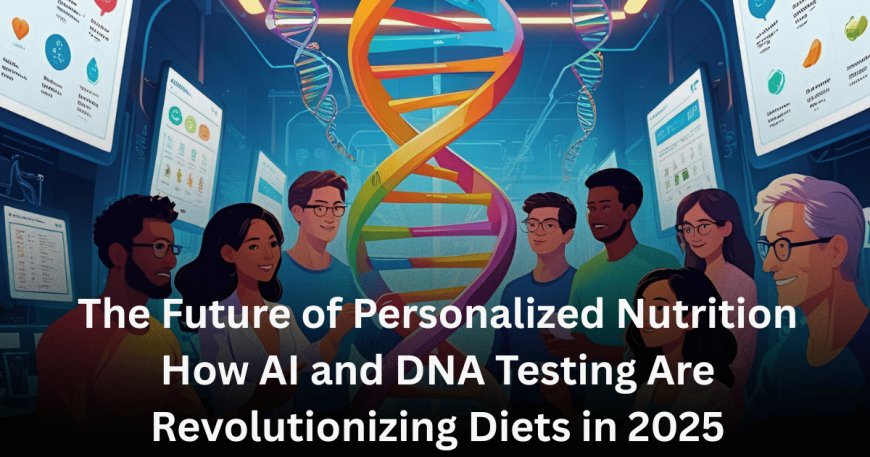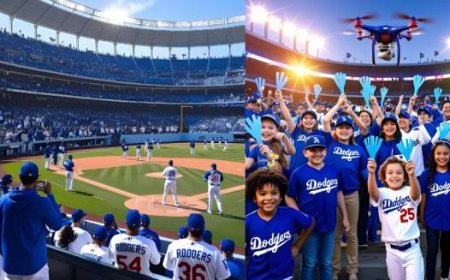The Future of Personalized Nutrition: How AI and DNA Testing Are Revolutionizing Diets in 2025
The Future of Personalized Nutrition: How AI and DNA Testing Are Revolutionizing Diets in 2025

The year 2025 has ushered in a transformation in how we approach food. No longer are diets one-size-fits-all or based solely on generic advice. Instead, people are customizing their nutritional intake based on the unique language of their DNA and the precision power of artificial intelligence. What was once considered futuristic now feels as familiar as checking your smartwatch or scanning a QR code at a restaurant.
This revolution is driven by cutting-edge technologies that combine AI-driven data processing with insights from genetic testing. From preventing chronic diseases to optimizing athletic performance, personalized nutrition is reshaping health, wellness, and even the food industry itself.
🧬 Understanding Personalized Nutrition: The Basics
Personalized nutrition refers to dietary recommendations tailored to an individual's:
-
Genetic makeup (DNA profile)
-
Lifestyle habits
-
Health history
-
Microbiome composition
-
Activity level and fitness goals
Unlike generic diets, which may work for some and fail for others, personalized nutrition aims to deliver what your body truly needs.
🤖 How Artificial Intelligence Supercharges Nutrition
AI plays a crucial role in translating complex biological data into simple dietary suggestions. Here’s how:
-
Data Integration: AI systems can pull together inputs from wearables, health apps, blood tests, and DNA results to get a 360-degree view of your health.
-
Predictive Modeling: Machine learning algorithms predict potential deficiencies or sensitivities before they manifest.
-
Real-Time Recommendations: AI adjusts your nutritional plan based on daily activity, sleep, or stress, creating dynamic diet plans.
-
Behavioral Nudges: With smart notifications, AI reminds users to hydrate, consume more fiber, or skip that late-night snack.
The result is a digital nutritionist that never sleeps, ready to help you eat better and smarter.
🧪 DNA Testing: The Genetic Blueprint of Your Diet
Our genes influence how we metabolize nutrients, respond to certain foods, and develop food sensitivities. In 2025, DNA testing kits will be more accessible, affordable, and insightful than ever.
These tests uncover traits such as:
-
Carbohydrate and fat sensitivity
-
Vitamin absorption rates
-
Lactose or gluten intolerance
-
Caffeine metabolism
-
Risk factors for conditions like diabetes or heart disease
For instance, if your DNA suggests slower caffeine metabolism, AI might recommend reducing coffee intake or avoiding it after noon to improve sleep quality.
📱 Smart Platforms and Apps: Nutrition in Your Pocket
In 2025, several platforms combine AI and genetic data to craft hyper-personalized dietary programs. Users simply upload their genetic test results, and the app:
-
Generates meal plans tailored to their biology
-
Offers recipes aligned with their nutrient needs
-
Tracks progress in real time
-
Integrates with grocery delivery services to suggest best buys
Apps like Nutrigen, GeneFuel, and BioByte have gained popularity, bridging the gap between science and practicality.
🥗 Applications in Everyday Life
Personalized nutrition isn’t just a scientific fad it’s changing lives across sectors:
|
Application |
Impact |
|---|---|
|
Athletes |
Optimized diets for peak performance and recovery |
|
Diabetics |
Blood sugar control through genome-based meal timing |
|
Weight Management |
Sustainable results with DNA-informed caloric balance |
|
Seniors |
Age-specific nutritional needs are addressed precisely |
|
Children |
Allergy prevention and enhanced cognitive development |
Even hospitals and insurance companies are beginning to incorporate genetic nutrition counseling into preventive health strategies.
🌿 The Rise of Nutrigenomics and Nutraceuticals
Nutrigenomics, the study of how food interacts with genes, is now a booming field. Nutraceutical companies are creating supplements tailored to individual genetic markers. For example:
-
Custom probiotic blends for your gut microbiome
-
Omega-3 capsules for those with inflammation-prone genes
-
Iron formulas matched to absorption efficiency
This shift empowers users not only to eat better but also to supplement smarter.
🌍 Ethical Considerations and Challenges
With innovation comes responsibility. There are valid concerns:
-
Privacy: Who owns your genetic data?
-
Access: Can low-income populations benefit from these advances?
-
Accuracy: How reliable are AI predictions in edge cases?
-
Cultural Sensitivity: Can personalized nutrition adapt to traditional diets?
Regulatory bodies and tech companies are working to ensure transparency, inclusivity, and equity. Open-source platforms and sliding-scale pricing models are helping close the gap.
📈 What’s Next for Personalized Nutrition?
Looking beyond 2025, experts predict:
-
Integration with mental health data to address emotional eating
-
AI chefs that design and prepare meals based on your biometrics
-
Home testing kits that update your dietary plan monthly
-
Virtual nutrition coaches powered by conversational AI
This convergence of biotech and lifestyle is poised to redefine wellness as something proactive and personalized rather than reactive and standardized.









































